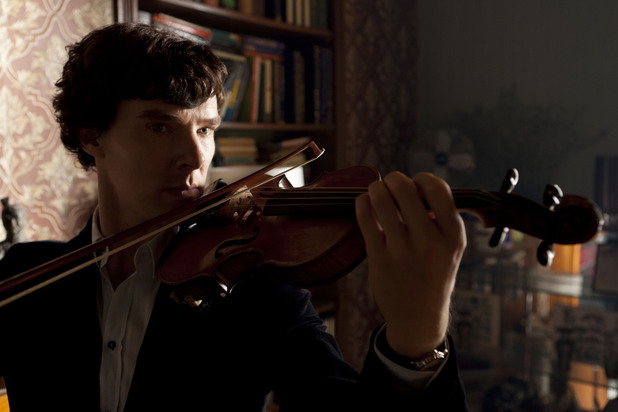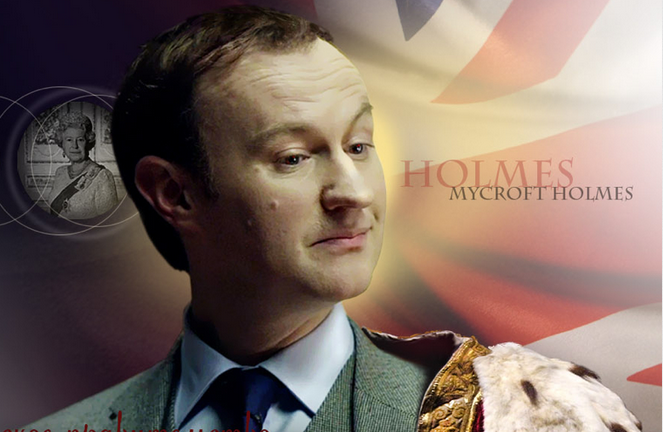
BBC Sherlock Fan Forum - Serving Sherlockians since February 2012.
- Davina
- Moderator
 Offline
Offline 
- From: The Only Way is Essex UK
- Registered: February 9, 2012
- Posts: 9,714
Moriarty and Sherlock Hero/Villain Mirror
This may be dangerous...but I have been pondering for some time the relationship and influence Moriarty and Sherlock have on each other as antagonist and protagonist. Having read the article, and others relating to what makes a good villain, on the blog referenced by Carl Powers in the Benedict Cumberbatch thread I have distilled some ideas as follows:
1. It would appear that the 'careers' of both Sherlock and Moriarty started with the murder of Carl Powers. Moriarty, either directly or indirectly responsible for the murder and Sherlock being the oly one realising the importance of the missing shoes and alerting the police. This is the start of their careers as 'consulting criminal' and 'consulting detective', even though they were both very young at the time. (TGG)
2. Both Sherlock and Moriarty have experienced ridicule. Moriarty gives as his sole reason for killing Carl the fact that he laughed at him - we never find out why. Reference also Mycroft's ridicule of John in TRF when John suggests that the person who divulged so much to the journalists might be an old school friend. Others on the forum have suggested this is Mycroft being cruel, in my opinion it is him being truthful, albeit bluntly. When Moriarty gives this as a reason for killing Carl, Sherlock would be able to acknowledge the effect ridicule may have on someone. Remember he was also 'hated' at University (TBB). They are both, to a certain extent, social misfits.
3. It is possible that Moriarty was at the pool when Carl died, however I think it is more likely that he got someone else to do the deed or at least to take the shoes. This would also fit in with his later comments that he doesn't get his own hands dirty, he usually gets someone else to do his dirty work. Sherlock too, at times, does not do his own dirty work either such as in SiB when he gets John to go traipsing off doing the legwork. ( The thing I will also say here is that, of course, the shoes are a plot device, however Moriarty all those years before would not have known that anyone would have followed up their disappearance, certainly not a young Sherlock, of whose existence he knew nothing. Why did Moriarty keep the shoes? )
4. When Moriarty shouts out 'That's what people do!' (TGG) this is echoed in Sherlock's speech to John on the roof of St. Barts, just before he jumps (TRF) where he also says, 'That's what people do, don't they?' There is a sense of a back story to this declaration by Moriarty and there are also hints of family loss in Sherlock's back story. Mummy is spoken of in the past tense 'You know how it always upset Mummy.' (ASiP) and no mention of a father figure at all. Sherlock snaps at Mycroft when he says, 'I'll be Mother,' when pouring the tea in the palace scene, with the retort, ' And there's a whole childhood in a nutshell.'
5. In the rooftop scene in TRF Moriarty says to Sherlock, 'No, you're me. You're me!' straight after Sherlock has said that he may be on the side of the Angels but Moriarty should not make the mistake of thinking that he is one of them. It is clear that it is quite possible, nay probable, that Sherlock could have gone exactly the same way as Moriarty. This links to the reference again of 'consulting criminal' 'consulting detective'; it takes a thief to catch a thief, as they say. Sherlock declares that he is prepared to do anything, to do things that ordinary people will not do and at first Moriarty is not convinced, however the 'Angels' speech convinces him and he realises then that Sherlock is actually just like him and really will do anything that is necessary. He realises that Sherlock is a mirror of him and visa-versa. It is surely no coincidence that antagonist and protagonist are standing so close, face-to-face in this scene, just like someone looking at their own reflection in a mirror.
6. In the scene in the flat (TRF), when Moriarty and Sherlock are drinking tea and verbally jousting with one another, Moriarty is literally a mirror-image of Sherlock. By holding his tea cup left-handed he mirrors exactly Sherlock holding his cup.
Finally to refer to a couple more ideas in the blog mentioned at the start of this post:
'A great villain UNDERSTANDS (the protagonist) ...better than any other living soul. That is the ultimate seductiveness of the devil - that he GETS you- right down to your vey soul. Moriarty seems to do this to Sherlock.'
'A story is very often a thematic argument between a hero/ine and an antagonist...On a basic level, the hero/ine represents one vision of how to live, and the antagonist another. Very often the antagonist also presents a dark vision of what the hero/ine could become...and it's through battle with the antagonist that the hero/ine is able to change.'
Food for thought...what do you think?
![]()
---------------------------------------------------------------------------------------------------------------------------------------------
Don't make people into heroes John. Heroes don't exist and if they did I wouldn't be one of them.

- Sherlock Holmes
- Administrator
 Offline
Offline 
- From: 221B Baker Street
- Registered: February 7, 2012
- Posts: 5,162
Re: Moriarty and Sherlock Hero/Villain Mirror
Definitely some interesting points, and it's been said before that Sherlock would have made a formidable criminal. When he's mocking the lack of action in the criminal classes he even comments, "good job I'm not one of them" and I'm pretty sure it's mentioned in the canon a few times too.
They're also both highly intelligent and get bored easily. They do have a lot in common, just that Sherlock chose to use his skills for good instead of evil!
I also think that's why it's so easy for people to believe Richard Brook and believe that Sherlock is a fake. There are probably a lot more people like Donovan who believe that Sherlock is a psychopath and "psychopaths get bored" etc.
---------------------------------------------------------------------------------------------------------------------------------------------
Eventually everyone will support Johnlock.
Independent OSAJ Affiliate

- kazza474
- High Functioning Sociopath
 Offline
Offline 
- From: Australia
- Registered: February 9, 2012
- Posts: 2,845
Re: Moriarty and Sherlock Hero/Villain Mirror
Interesting. Not sure about the mother being dead though. They were talking about dinners as youngsters, you'd use past tense for that anyway.
____________________________________________________________________________________________
Also, please note that sentences can also end in full stops. The exclamation mark can be overused.
Sherlock Holmes 28 March 13:08
Mycroft’s popularity doesn’t surprise me at all. He is, after all, incredibly beautiful, clever and well-dressed. And beautiful. Did I mention that?
--Mark Gatiss
"I know that you believe you understand what you think I said, but I’m not sure you realize that what you heard is not what I meant."
Robert McCloskey
- Davina
- Moderator
 Offline
Offline 
- From: The Only Way is Essex UK
- Registered: February 9, 2012
- Posts: 9,714
Re: Moriarty and Sherlock Hero/Villain Mirror
It's just the way Mycroft says, 'You know how it used to upset Mummy.' i would have expected him to say upsets. Also the fact that they now both appear to be alone at Christmas.
![]()
---------------------------------------------------------------------------------------------------------------------------------------------
Don't make people into heroes John. Heroes don't exist and if they did I wouldn't be one of them.

- •
- Davina
- Moderator
 Offline
Offline 
- From: The Only Way is Essex UK
- Registered: February 9, 2012
- Posts: 9,714
Re: Moriarty and Sherlock Hero/Villain Mirror
Or does he say upset. Got to watch it again to check. Still past tense though.
![]()
---------------------------------------------------------------------------------------------------------------------------------------------
Don't make people into heroes John. Heroes don't exist and if they did I wouldn't be one of them.

- •
- kazza474
- High Functioning Sociopath
 Offline
Offline 
- From: Australia
- Registered: February 9, 2012
- Posts: 2,845
Re: Moriarty and Sherlock Hero/Villain Mirror
So you think that they would be having dinner with their mother these days if she were alive?
If I were her, I'd be in another country.
It is more than likely that she has passed on, but it's an assumption we should not make as there's no proof. I daresay it's irrelevant anyway.
____________________________________________________________________________________________
Also, please note that sentences can also end in full stops. The exclamation mark can be overused.
Sherlock Holmes 28 March 13:08
Mycroft’s popularity doesn’t surprise me at all. He is, after all, incredibly beautiful, clever and well-dressed. And beautiful. Did I mention that?
--Mark Gatiss
"I know that you believe you understand what you think I said, but I’m not sure you realize that what you heard is not what I meant."
Robert McCloskey
- Sherlock Holmes
- Administrator
 Offline
Offline 
- From: 221B Baker Street
- Registered: February 7, 2012
- Posts: 5,162
Re: Moriarty and Sherlock Hero/Villain Mirror
Lol, you'd be in another country to get away from your two annoying sons, or you'd be in another country for the weather or some other reason?
---------------------------------------------------------------------------------------------------------------------------------------------
Eventually everyone will support Johnlock.
Independent OSAJ Affiliate

- besleybean
- Threatened Knighthood
 Offline
Offline 
- From: Carnoustie, Angus, Scotland.
- Registered: October 4, 2012
- Posts: 21,379
Re: Moriarty and Sherlock Hero/Villain Mirror
I do think Moriarty and Sherlock mirrored each other well.
It'll be interesting to see the dynamic between Moran and Sherlock.
---------------------------------------------------------------------------------------------------------------------------------------------------------------

 1 of 1
1 of 1